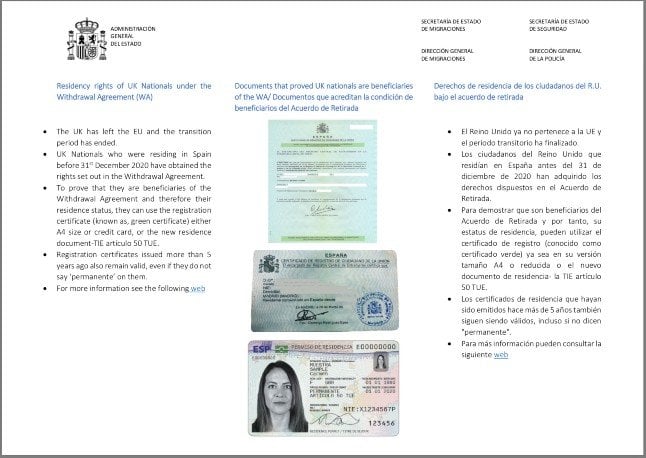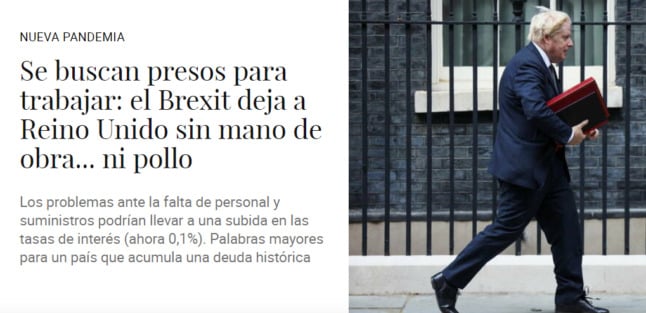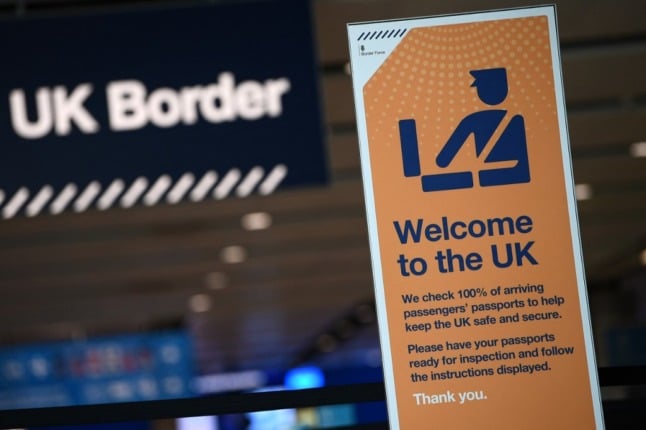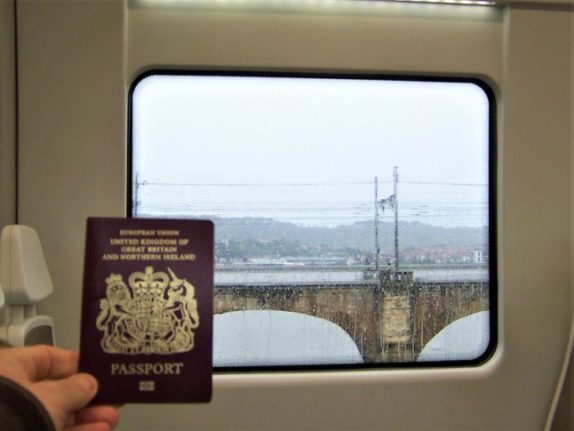Change in UK passport validity requirements
On July 27th British authorities started requiring that British passports be “valid for at least three months after the day you plan to leave Spain and less than 10 years old”.
These rules apply for travel to and between most countries in Europe.
Brits were previously warned they would need to ensure passports were valid for at least 6 months when travelling to countries around the bloc.
You can find out more on this page on the UK government website.
Problems with driving licence exchange
“I’ve heard of several British nationals who registered their intention to exchange their UK licence for a Spanish one before the deadline, but also renewed their British licence because it was due to expire,” Anne Hernández, head of Brexpats in Spain, told The Local.
“As a result, Spain’s traffic authorities have been telling people in this situation that the licence exchange can’t be carried out because the new UK driving licences do not bear the EU logo, and are therefore not EU driving licences.”
Hernández, who has had this information confirmed by Spanish authorities, said it could potentially mean that many more Brits in Spain who registered their intent to exchange their licence for a Spanish one before December 30th 2020 but who have renewed their UK licence since have to sit a Spanish driving test.
“This was never explained to us in the first place, otherwise we could have warned people.
“All these people were trying to do is be legal. What were they supposed to do, drive around on an expired licence? What would the police say? If there was an accident, would their insurance still have been valid?
In June 2021, Spanish authorities extended the validity of UK driving licences in Spain until October 31st 2021, giving more British drivers in Spain (who registered intent) the opportunity to complete their exchange for a Spanish one in time, drive legally in Spain or sit their Spanish driving test before the deadline.
READ MORE: Spain extends validity of UK driving licences until October 31st 2021
Old green residency documents not being recognised for official matters
Spanish and UK embassy authorities are now actively encouraging British residents in Spain to exchange their old residency documents for the new biometric TIE card, highlighting the fact that it’s a durable photo ID, that it clearly states Britons’ rights under the Withdrawal Agreement and that it’s widely recognised compared to the old green residency document.
The exchange remains optional, not compulsory, and the Spanish government even created an official downloadable document stating that green residency documents are valid for Brits to prove residency in Spain at airports and ports.

Nonetheless, the recognition of the green ‘Certificado de Registro de Ciudadano de Unión Europea’ isn’t just called into question when travelling.
“Some banks are not accepting the old green residency paper sheet or card from British customers, even though they’re perfectly valid,” Anne Hernádez told The Local Spain.
“Also, British residents in Spain applying to enroll in degrees and courses at Spanish universities are also being asked for the new TIE card as their green residency documents aren’t being accepted.
“One university even suggested that they would have to apply as a non-EU applicant, which would cost ten times more.
The news from Britain
Sue Wilson, head of Bremain in Spain and, together with Anne Hernández, one of the citizen campaigners helping Brits in Spain who was recently awarded an MBE, told the Local that “in August, our main Brexit concerns have been UK-based ones – such as shortages of staff and supplies and the impact on prices”.
The alarming news has been covered widely in the Spanish press, with everything from the story of business leaders calling for prison inmates to cover job shortages, to beer supplies drying up and Christmas being at risk all given coverage.
Wilson highlighted how speculation about whether Spain would be included in the UK’s red travel list requiring an expensive ten-day hotel quarantine “has kept people waiting, affecting Brits’ ability to travel to the UK or have visitors”.
READ MORE: Spain remains on UK’s quarantine-free amber list for travel
“The main Brexit issues now, and likely always high on our agenda, are in relation to the loss of our freedom of movement,” the Bremain in Spain chair concluded.

Spanish news website El Confidencial’s story on how convicts may fill gap in UK workforce and how chicken supplies are running out.
Brits need to be aware of ALL the implications of Spain’s non-lucrative visas
Spain’s NLV, as it is now regularly being called, is one of the best visa options for Britons who weren’t living in Spain before Brexit to still be able to move over here.
Most of you will know it requires having to show considerable income and comprehensive health cover to not be a burden for the Spanish state, but according to Anne Hernández, people aren’t aware of the other implications and responsibilities.
“Some people aren’t aware that you still need to apply for a TIE after getting the NLV, others don’t know that it involves becoming a resident, they don’t always know about the limits they can be away from Spain for, and finally not everyone is informed about the fact that they’re fiscal residents,” Hernández told The Local.
READ MORE:
- Reader question: Can I be a non-resident for tax purposes with Spain’s non-lucrative visa?
- How much money do Britons need for Spain’s non-lucrative visa in 2021?
Another point which is sometimes overlooked, even though its name suggests it, is that Britons cannot work in Spain if they have a non-lucrative visa.
Brits with EU partners warned over future problems upon returning to live in UK
Under rules agreed as part of the Brexit negotiations, Brits can move back to the UK without their European partners needing costly visas as long as they do so before March 29th next year.
But despite assurances given by the British government, the citizens’ rights campaign group British in Europe is warning that it is already seeing problems with the system, despite the deadline still being six months away.
EU nationals moving to the UK as the spouse of a British person have until March 29th 2022 to apply for Settled Status.
However, before they can apply they need to obtain a new EU family permit from the Home Office in the UK.
And British in Europe is warning that the Home Office is turning down some of these applications, often on seemingly flimsy or technical grounds.
READ MORE: What Brits with EU partners need to know about returning to live in UK
 Photo: Daniel LEAL-OLIVAS/AFP
Photo: Daniel LEAL-OLIVAS/AFP
No more need for military permits for some British buyers in Alicante
In early July, Spain’s Ministry of Defense published an order cancelling the requirement of a military authorisation for non-EU property buyers in an area that’s particularly popular with foreign buyers: Alicante province.
The decision benefits Britons who want to buy a property in the Alicante municipalities of Torrevieja, Orihuela, Pilar de la Horadada or San Miguel de Salinas, all classified as areas of strategic interest for Spain’s Defence Ministry.
You can read more about this Franco-era permit and the new rules for buyers in Alicante in the link below.
READ MORE: Do Brits and other non-EU property hunters still need a military permit to buy in Spain?
Any upcoming events for Brits in Spain?
There’s a Facebook Live seminar on ‘How to bring a family member to live with you in Spain’ hosted by Age in Spain, taking place online at 5pm Tuesday August 31st.
If you want to find out if there are other pop-up events aimed at UK nationals in Spain, check the UK government website here.



 Please whitelist us to continue reading.
Please whitelist us to continue reading.
Member comments